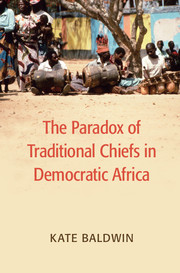Book contents
- Frontmatter
- Dedication
- Contents
- List of Figures
- List of Tables
- Acknowledgments
- PART I TOWARD A NEW THEORY OF CHIEFS
- PART II CHIEFS, DEVELOPMENT, AND ELECTIONS IN ZAMBIA
- 5 Introduction to Zambia
- 6 Chiefs and Local Public Goods Provision
- 7 Electoral King Makers
- 8 Chiefs and the Voters' Calculus
- PART III TRADITIONAL LEADERS IN AFRICA AND BEYOND
- Appendix A Cross-National Data Set of Chiefs' Power
- Appendix B List of Interviews and Interview Protocols
- Appendix C Data Set on Local Public Goods and Chiefs
- Appendix D Survey of Chiefs and Chiefdom-Level Data Set
- Appendix E Household Survey and Experiment
- References
- Index
- Books in the Series
8 - Chiefs and the Voters' Calculus
from PART II - CHIEFS, DEVELOPMENT, AND ELECTIONS IN ZAMBIA
Published online by Cambridge University Press: 05 November 2015
- Frontmatter
- Dedication
- Contents
- List of Figures
- List of Tables
- Acknowledgments
- PART I TOWARD A NEW THEORY OF CHIEFS
- PART II CHIEFS, DEVELOPMENT, AND ELECTIONS IN ZAMBIA
- 5 Introduction to Zambia
- 6 Chiefs and Local Public Goods Provision
- 7 Electoral King Makers
- 8 Chiefs and the Voters' Calculus
- PART III TRADITIONAL LEADERS IN AFRICA AND BEYOND
- Appendix A Cross-National Data Set of Chiefs' Power
- Appendix B List of Interviews and Interview Protocols
- Appendix C Data Set on Local Public Goods and Chiefs
- Appendix D Survey of Chiefs and Chiefdom-Level Data Set
- Appendix E Household Survey and Experiment
- References
- Index
- Books in the Series
Summary
This chapter builds on the evidence in Chapter 7 to understand how rural voters view the role of chiefs in the political process. Even if politicians and chiefs themselves describe traditional leaders primarily as development brokers, it remains possible that voters understand chiefs' influence in different terms. Ultimately, to understand the implications of powerful traditional chiefs for democracy in Africa, we must consider how voters view their role in the electoral process.
Specifically, this chapter asks why voters take their chiefs' opinions of different candidates into account to the extent that they do. I begin by outlining what the vote-broker and development-broker models predict voters' decision making should look like. This was also discussed in Chapter 4, and readers may want to refer to Figure 4.1 while reading the paragraphs that follow.
In the vote-broker model, citizens choose to vote with their chief because of extrapolitical calculations. For example, voters may be worried about losing access to resources the chief controls if they do not vote for the chief's preferred candidates (the contingent-exchange version of vote brokering). Even though the ballot is supposed to be secret, voters may believe that powerful traditional leaders can figure out how they vote and punish (or reward) them on this basis. If the possibility of the chief being able to monitor and sanction voters is sufficiently high, this may swamp all other considerations in determining vote choice. After all, in an election of any size, any individual's vote has minimal impact on who wins. In contrast, an individual's vote choice directly determines whether he or she receives preferential treatment or resources from the chief if the individual is offered this kind of electoral quid pro quo.
However, voters may not need to believe that they can be punished by chiefs for voting against their wishes for vote brokering to work. Individuals may vote with their chief because of established norms of deference or allegiance (the norm-driven version of vote brokering). Traditional chiefs typically build up networks of clients who depend on them for assistance during times of need over the years. During election campaigns, a chief may ask these individuals to reciprocate by voting for the chief's preferred candidate.
- Type
- Chapter
- Information
- The Paradox of Traditional Chiefs in Democratic Africa , pp. 140 - 156Publisher: Cambridge University PressPrint publication year: 2015



